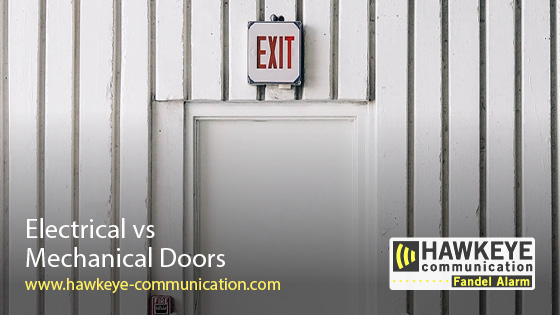Electric vs Mechanical Doors
Electric vs Mechanical Doors

Commercial security begins with the installation of proper door technologies. Selecting the right door closers and operators is as important as selecting the right door and installing quality security measures. The ideal mechanical or electrified door operator and closers depend on your door’s security and fire safety requirements in addition to your preferred accessibility and aesthetic features. Choosing the wrong closer and operator compromises efficiency, security, and safety. Here is a guide on how to ensure that you get the right door type to ensure long term reliable security and accessibility.
Electrified door operators
Though some electrified door operators rely on their power supply, others require electricity supply to function maximally. There are four main types of electrified door operators; low energy electro-hydraulic operators, low energy electromechanical operators, regenerative power operators and wave to open switches.
Regenerative power operators
Regenerative power operators are low energy units that offer commercial security for many years. The operators are designed to generate the power they need and rely on an onboard battery that supplies enough energy to open and close the doors for about 24 hours. Therefore, they do not require wiring and can easily be installed anywhere whether or not an external source of power is available. As such, they are ideal for use in high traffic commercial facilities where automated door operation may be needed occasionally.
Low energy electromechanical door operators
Low energy electromechanical doors rely on low power supplies and are quiet. They feature a gearbox that offers consistent and automatic operations for some years. However, they must be connected to a reliable external power source a factor that complicates their installation. They are ideal for use in commercial buildings that rely on automatic door operations.
Wave to open switches
Wave to open switches are ideal for people who seek aesthetically appealing features. They have motion trigger operations to offer free to touch operations. Though common due to their aesthetic appeal, they are ideal for use in areas where hygiene is the main concern. As such, commercial buildings install them in public restrooms and medical settings.
Low energy electro hydraulic door operators
These door operators are dependable and durable, can be used on interior or exterior doors. They are also used in areas where automatic operations are not always needed. Hence, they are ideal for use in low traffic areas.
Mechanical Door Closers
Mechanical door closers ensure that doors are completely closed after being opened. Hence, electricity is not required. Two main types of mechanical door closers are; concealed closers and surface mounted closers.
Surface mounted closers
Surface mounted closers are easy to adjust in case of misalignment and require minimal door and frame preparation; they are easy to install. However, they are visible a factor that can be a downside based on your commercial security concerns.
Concealed closers
Unlike surface mounted closers, concealed closers are challenging to install because they require detailed door and frame preparation. Their main advantage is that they are not visually obvious. The commonly used overhead concealed closers rely on motors located above the door and a side track located at the door’s top rail. These two critical features are completely concealed once the door closes.
Summary
Selecting the right door closers and operators is important at ensuring commercial security. All you need is detailed security access to determine the ideal electric operators or mechanical closers for your commercial residence.